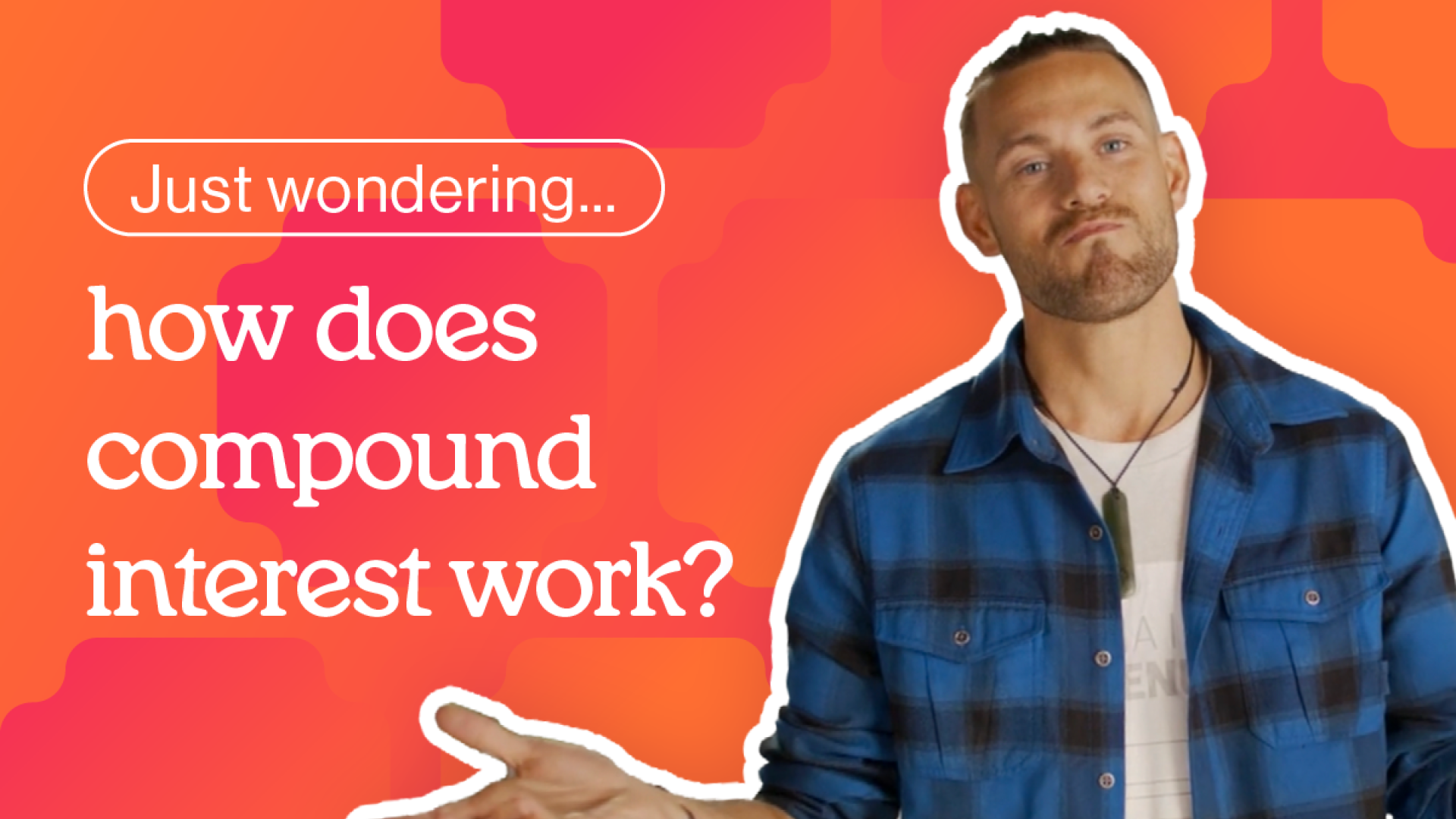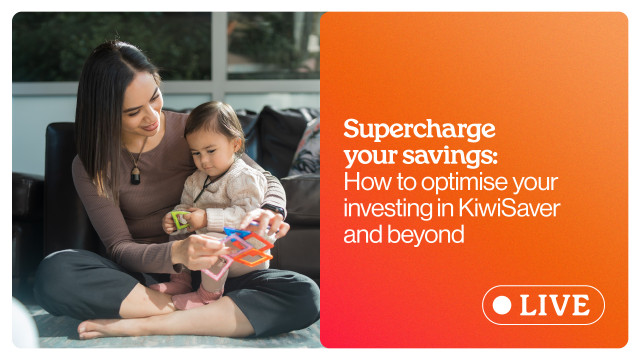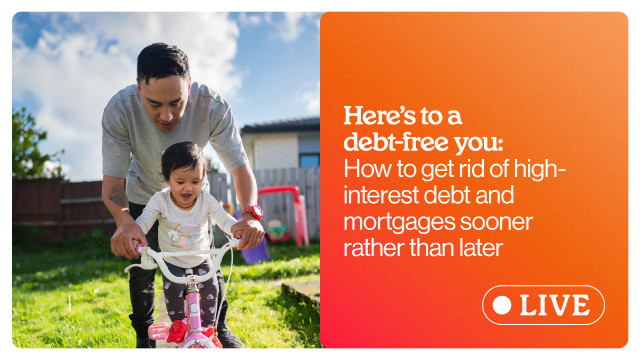Budgeting

Planning & budgeting
Saving & investing
KiwiSaver
Tackling debt
Protecting wealth
Retirement
Home buying
Life events
Setting goals
Money tracking
Plan your spending with a budget
Getting advice
Studying
Get better with money
What pūtea beliefs do you have?
How to save your money
How to start investing
Find a financial adviser to help you invest
Your investment profile
Compound interest
Net worth
Types of investments
Term deposits
Bonds
Investment funds
Shares
Property investment
How KiwiSaver works and why it's worth joining
How to pick the right KiwiSaver fund
Make the most of KiwiSaver and grow your balance
How KiwiSaver can help you get into your first home
Applying for a KiwiSaver hardship withdrawal
How to use buy now pay later
What you really need to know before you use credit
How to get out of debt quickly
Credit reports
Know your rights
Pros and cons of debt consolidation
Credit cards
Car loans
Personal loans
Hire purchase
Student loans
Getting a fine
What happens if I start to struggle with moni?
How to protect yourself from fraud and being scammed
About insurance
Insurance types
Insuring ourselves
Wills
Enduring powers of attorney
Family trusts
Insuring our homes
Losing a partner
Redundancy
Serious diagnosis
How to cope with the aftermath of fraud
Separation
About NZ Super
This year's NZ Super rates
When you’re thinking of living in a retirement village
How to plan, save and invest for retirement
Manage your money in retirement
Find housing options in retirement
Planning & budgeting
Saving & investing
KiwiSaver
Tackling debt
How to use buy now pay later
What you really need to know before you use credit
How to get out of debt quickly
Credit reports
Know your rights
Pros and cons of debt consolidation
Credit cards
Car loans
Personal loans
Hire purchase
Student loans
Getting a fine
What happens if I start to struggle with moni?
View all
Protecting wealth
Retirement
Home buying
Resources
Videos
Podcasts
Just wondering
Help with the cost of living
In need of financial help
Booklets
Glossary
Blogs
View all

We all do some type of mahi for our money - but how can we supercharge our investments so that our money does the mahi for itself and earns even more money without us even touching it? It all works because of this amazing phenomenon called Compound Interest. So what actually is Compound interest and how does it work? This video will show you.
We all do some type of mahi for our money but how can we supercharge our investments so that our money does the mahi for itself and earns even more without us even touching it?
It all works because of this amazing phenomenon called compound interest.
So what actually is compound interest? And how does it work?
Well, compound interest is the interest that you earn on interest. It supercharges our savings and investments. It's where our money is literally working for us. So let's start by explaining interest.
Interest is what you earn when you let your money get used by someone else, like when you give your savings to the bank or when you invest in a company. And interest is also what you pay when you borrow money. The rate may be high or it may be low.
Let's see it in action using this thing we call the burger analogy.
This burger costs $10 at the takeaway shop.
If we made our own food at home and invested that $10, and we just left it there, then compound interest would start doing its thing. And we would start earning interest on that $10.
If the interest rate was say 5%, you'd earn 50 cents on that $10 after a year.
So at the end of the year, the interest gets added to your $10 and you have $10.50.
So at the end of year two, at a 5% interest rate, you earn even more interest, 52 cents.
Chur!
You now have $11.02. So your interest is literally earning you interest, which then earns more interest and it gets bigger and bigger each year. And that's just with a one-off $10.
Imagine if you were putting aside $10 every fortnight or every week.
Now, wouldn't that be a massive burger? This is the supercharger for your money.
If we invested $10 every week, then after 20 years, assuming a constant 5% interest rate, you've invested just over 10K but it would have grown to over $17,000.
And if you are invested for 30 years, you would have put in around 15K but you would have over 35,000.
And after 40 years, you'd have put in just over 20K but it would have grown to $64,000.
So with compound interest doing its job, and you're supercharging with payments as you go, that's over three times
the amount you put in.
Pretty good, hey?
And that's because of the interest you've earned on it.
The higher the interest rate of your investment, the more it grows and the earlier you start putting money in, the longer your interest has to compound and earn you even more money.
And that's why we should start early. So that's how compound interest works.
On one hand, it can work for us by supercharging our investments, and on the other hands, it can screw us over by
supercharging our debts.
So just remember, compound interest is when interest earns interest. The earlier you start investing, the more time your money has to earn interest and the more money you'll make.
Invest little and often.
And compound interest also affects debt. If you wanna see exactly how it might work for you, have a tutu with our savings calculator.

Webinar: Self-care starts here – How to save more money and boost your wellbeing

Webinar: Supercharge your savings – How to optimise your investing in KiwiSaver & beyond

Webinar: Here’s to a debt-free you – How to get rid of high-interest debt & mortgages sooner rather than later

Webinar: Enjoy the best, prepare for the worst – How to stay covered & protect your peace of mind

Webinar: Te Rito Hou – Kia Ora

Insurance

Use verification code from your authenticator app. How to use authenticator apps.
Code is invalid. Please try again
Don't have an account? Sign up
Or log in with our social media platforms


A Sorted account gives you a personal dashboard where you can save your tools, track your progress and you'll also receive helpful money tips and guidance straight to your inbox.
Or sign up with our social media platforms


